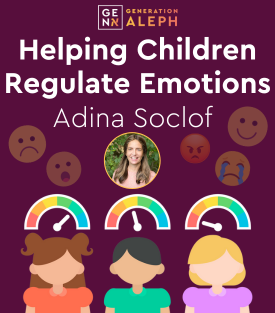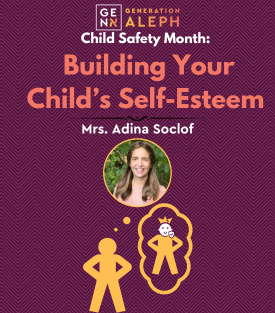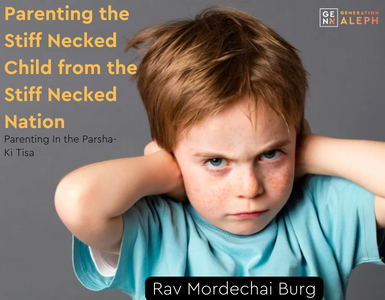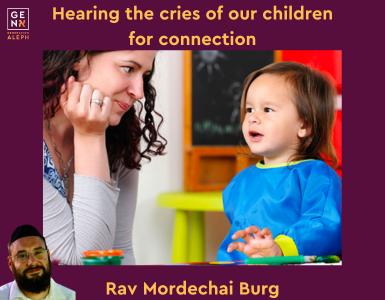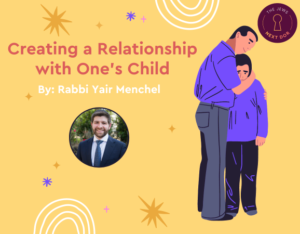
When thinking of a parent creating a relationship with a child, I immediately think of my own relationship with my parents. I have always felt extremely fortunate to have a great relationship with my parents. I have always felt very close to my parents, and most of all, revered them.
How did that come about?
First, I look to the Torah to study the parent-child relationships there. When I think of the paradigm for a parent-child relationship in the Torah, my mind immediately goes to Yaakov, in the moments before his death. Rav Zalman Sorotzkin, in his sefer, Oznayim L’Torah tells us that Yaakov asked Hashem to make him sick so that he would have a warning of when he would die, so that he could bless each of his children and give them his final message. What ensued was something so telling of the relationship Yaakov had with each of his children. Yaakov went on to bless, and rebuke, each of his children. This was no generic “I love you so much, you always cared so much for me” type of final message, but was truly specific to each child. In doing this, Yaakov Avinu, showed how connected he was with each child, how well he knew each child.
This reminds me of the classic Pre-Yom Kippur or Rosh Hashanah calls that everyone makes and gets, where one is asked for forgiveness, and then given a bracha. One can always tell how close the relationship is by how specific the bracha is. One is only going to give a specific bracha that is really specific to that person and everything they have going on in their life, if they are truly close with the person.

So there it is, step one of building a relationship with a child, and the sign of a close relationship, is when one really knows their child.
Knowing one’s child is the litmus test one can use to know if they really have a close relationship with their child. Can I answer basic questions about my child, like, who is their best friend? What is my child’s teachers name? Do they like them? Etc.
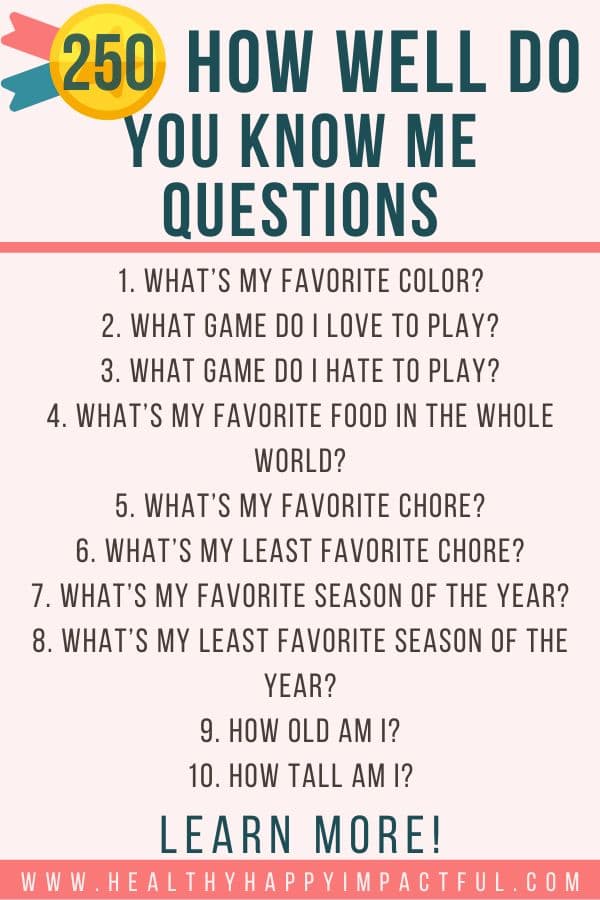
Rav Levi Yitzchak M’Birtditchov, the קדושת לוי, learned what true love is from two drunks. He was once at a bar raising money, and he overheard two drunks talking and expressing their love to each other. Finally, after saying it to each other a couple of times, one replied “if you really love me, then, why don’t you know what hurts me?”
Do we know what really hurts our children? Do we know what keeps them up at night?
When the child comes home off the bus, don’t ask how was your day, but ask pointed, specific questions, that will show an eagerness to really learn them, and to fully understand what is most important to them.
The only way one can fulfill the famous chinuch concept from משלי of חנוך לנער על פי דרכו, is if one knows that child’s דרך to be מחנך them towards.
One should treat their child as that friend that they so badly want to be close with, to always spend time with. There is nothing wrong with being friends with one’s child, as long as: A. There are clear boundaries. B. The parent is the child’s friend, but the parent does not rely on the child for friendship, or approval, etc.
One must be careful, however, to not favor one child over others in developing that close relationship, as we see by Avraham, favoring Yitzchak over Yishmael, and Yaakov, favoring Yosef over the other brothers. Despite things working out in the end for Yosef, and it was clearly all part of Hashem’s plan, there is no denying that the dynamic it created within the brothers was not a positive one, to the point that even after Yaakov’s death, the brothers lied and offered themselves as slaves, thinking Yosef would take retribution.
The key to creating a good relationship with a child is to establish a foundation of trust, communication, and most importantly, love. This love that one must have for this parent-child relationship must be unconditional, no if’s, but’s, or ands – simple love for the sake of love.
The גמרא/talmud states that a בן סורר ומורה, a wayward son, will only happen if the parents themselves bring the child to the בית דין (court house). The second גמרא/talmud says that even if the parents bring the child, if they forgive the child, the child is exempt from the death penalty. The obvious questions are why? Why does it matter who brings the child to court, and why does it matter if they forgive the child? If the reason for law of the בן סורר ומורה is because of his tendencies which show he will be a murderer, why do these factors matter? The Sogitchover Rav, in his שם משמואל writes that as long as parents are supporting a child, and are loving a child, and are doing as much as they can to guide and help him, the child will not become a בן סורר ומורה. Once the parents give up and bring the child to the court, then the child will become a בן סורר ומורה. However, even if the verdict is decided, if the parents forgive the son because of their love for him, he will not become a בן סורר ומורה, because it is all dependent on the parents love for their child.
Each week, we give the ברכה that יעקב אבינו gave to אפרים and מנשה. What’s interesting to note is that receiving this ברכה was not so simple for אפרים and מנשה. If one recalls, יעקב was hesitant to give them ברכות because of the flaws in their descendents, and only felt better after יוסף said “בני הם”, “they are my children”. What did that change for יעקב? They still had their flaws? Rav Yaakov Shapiro said that יעקב’s concern was that they are not worthy of being part of כלל ישראל, and יוסף’s response of “בני הם” was that despite having these flaws, they are still my children, and I love them no matter what. Up until that point, those with flaws like עשו or ישמעאל, were out, they were not welcome to be a part of כלל ישראל, and יוסף was saying “עד כאן” – this stops now, because the Jewish people will not be able to withstand those parameters. Upon hearing this, יעקב realized that יוסף was correct, and כלל ישראל can only continue with acceptance and love. Therefore, יעקב gives the ברכה of ישימך אלקים כאפרים וכמנשה, Hashem should give you like אפרים and משנה – not a ברכה to אפרים and משנה – but that one should have a father like אפרים and מנשה who loves them regardless of their flaws, regardless of their darker future. Every week, when we give this ברכה to our children, we are really giving a ברכה and reminder to ourselves to love our children no matter what, the way יוסף did, with acceptance of them, no matter how flawed or challenging they are, with unconditional love.
Once the parent has his foundation of unconditional love, some steps that can help create and maintain a positive relationship with a child include:
- Showing genuine interest in their lives: Take the time to listen to your child and learn about their interests, thoughts, and feelings.
- Setting clear boundaries and expectations: Children need structure and guidance, but it is important to explain the reasons behind rules and consequences, and to be consistent in enforcing them.
- Showing affection: Physical touch such as hugs, kisses and holding hands can help children feel secure and loved.
- Being a good role model: Children learn by example, so try to lead by example with your own behavior, attitude and values.
- Encouraging independence: As children grow, they need to learn how to make decisions and solve problems on their own. Encourage them to try new things and make mistakes, and celebrate their successes.
- Communication: Encourage your child to express their thoughts and feelings and actively listen to them. Be available to them when they need to talk.
- Flexibility and patience: Children’s needs and capabilities change as they grow, and it is important for parents to adapt and adjust their parenting style accordingly.
Remember that creating a good relationship with a child takes time and effort, and it is an ongoing process that requires patience, understanding and a lot of love.
I know that my close relationship with my parents is because my parents invested their time and energy into our relationship, and really did each of these 7 steps, and really gave me their full unconditional love.
Some of my fondest memories growing up were the days where me and my father had off, and we went to the city, spending the day at ESPN Zone, and getting lunch at Circa (such a shame both of these places closed, you don’t know what you are missing out on!). Or the times that my mother took me shopping when I got more into clothing. These days showed me that my parents really understood me, and took genuine interest in my interests for the sole reason that it was important to me.
I also know that when I was a teen, there were things that I did that were not necessarily in the comfort zone of my parents, like the things I wanted to spend money on, and yet my parents had patience with me, adjusting the way they generally parented, because that was what they knew I needed at that time. In doing this, they also encouraged my independence, as they let me explore the things I was interested in, especially when it came to deciding high schools, where my parents had a very strong preference, and I wanted a different school, and to their credit, they allowed me to go where I chose.
The purpose of this article is not to praise my amazing parents (although they really are amazing, and I love them very much), but rather, to give an example of how an amazing relationship can be formed between a parent and their child.
To learn more about this and go more in depth with simple frameworks, check out our course on Creating a Relationship with Your Child by clicking here.
I’d love to hear your feedback below ?
Submit your questions
"*" indicates required fields



